Disposal of Agricultural Waste Pesticides in Mississippi
Background and History
Waste pesticides are sometimes left over at the end of a growing season or when a product’s label is suspended, canceled, or expired. These products can be acquired unknowingly when a new property is purchased, or when a loved one passes away and relatives discover unused chemicals. If these products are not properly disposed of, they pose a risk to water quality, surrounding natural resources, and public health, especially in the event of a fire, leak, accidental poisoning, or severe weather event. People may dispose of waste pesticides improperly or store them indefinitely because it is costly to dispose of them through a hazardous waste contractor or because hazardous waste facilities are inconveniently located.
To help address these issues, the Mississippi Legislature passed a law in 1993 directing an increase in the manufacturer’s pesticide registration fee, a portion of which was to be used to fund a waste pesticide disposal program. This law went into effect on July 1, 1993, and was repealed on July 1, 1998 (Miss. Code Ann. § 69-23-301). During the time this law was enacted, and with support from leading agricultural and environmental agencies, the Mississippi State University Extension Service worked with the Mississippi Department of Agriculture and Commerce (MDAC) Bureau of Plant Industry to run the program. During this time, 38 one-day pesticide disposal events were held, collecting approximately 816,000 pounds of waste pesticides.
After the law was repealed in 1998, there was no dedicated source of funding for events. However, continued requests from farmers demonstrated that there was still a need for a waste pesticide disposal program. With support from MDAC, MSU Extension faculty in the agricultural and biological engineering department led the effort to secure funds for additional events in 2000. The Mississippi Department of Environmental Quality (MDEQ) provided funds for the waste pesticide disposal program through the Nonpoint Source Program of the Clean Water Act. The program resumed in 2000 and has been carried out since by MSU Extension with assistance from the MDAC Bureau of Plant Industry. From 2000 to March 2019, just over 1.6 million pounds of waste agricultural chemicals were collected and properly disposed of, bringing the total pounds collected since the program’s inception to 2.45 million (Table 1).
Table 1. Agricultural waste pesticides collected, 1993–2019.
|
Years active |
Number of events |
Pounds of waste pesticide collected (lb) |
|---|---|---|
|
1993–1998 |
38 |
816,000 |
|
2000–2004 |
* |
466,000 |
|
2005–2019 |
33 |
1.17 million |
Total collected: 2.45 million
*Data not available
Collection Events
Agricultural waste pesticide collection events are one-day events, usually held in the fall and early winter after harvest and before spring planting begins. Waste pesticides such as insecticides, herbicides, and fungicides are accepted at these events, along with plant growth regulators and surfactants. There is no limit to the age of the agricultural chemical accepted for disposal. There is no charge to the farmer or landowner to participate. Events are held in easy-to-access locations and are publicized in the surrounding counties, so they usually attract farmers from nearby counties.
While there is no guaranteed funding for this program, funds have been provided by MDEQ with assistance from MDAC year to year since 2000 to host two to three events per year. The number of events each year depends on the quantity of product collected at the first and subsequent events. For example, if an event held in mid-November is very successful with many people participating, there may be limited funds for subsequent events.
Because farmers and landowners are not required to preregister or sign up in advance, coordinators do not know how much product to expect for each collection event. As a result, one event must be held and the product measured for payment before another event can be planned. To date, this method has worked well in Mississippi, with widespread participation and a general understanding of how the collection events work.
Participants are not asked to complete a survey or questionnaire, and no personal information is collected from participants. A simple count of vehicles and the county of origin are recorded, to determine geographical areas of need for future events. The hazardous waste contractor weighs the pesticides after they are transported to the processing facility and records the amount and type of material collected. The contractor’s disposal costs are on a per-pound basis, in addition to a base setup fee.
Participant Responsibility
Participants are responsible for safely loading and transporting waste pesticides to the collection site. When loading pesticides, you should wear full-length, chemical-resistant clothing, including gloves and goggles. Read the label, if it is still intact, to check for any special handling requirements. If your load weighs less than 1,000 pounds, a placard is not required. If your load weighs more than 1,000 pounds, you will need a placard for your vehicle, which you can get from your pesticide dealer (Figure 1). For loads that weigh more than 1,000 pounds, it may be easier to split the load into more than one trip or use more than one vehicle to transport the load.
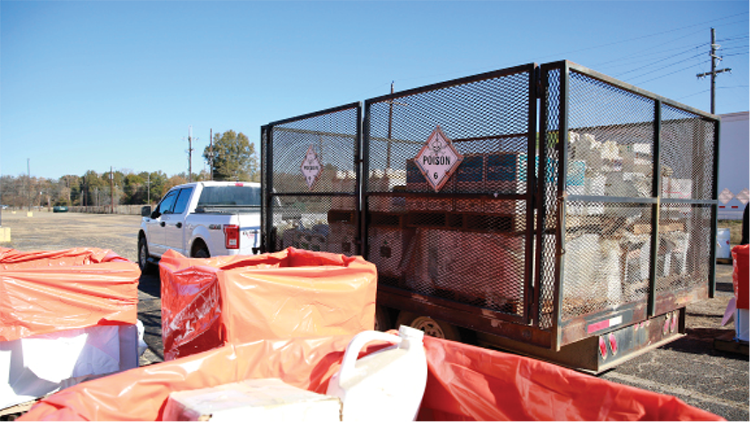
Move containers carefully, and try not to drag them over rough surfaces that might tear bags or rip containers. Check for any leaks and containers that look brittle, weak, or damaged. Leaky containers must be transported in secondary containers: trash bags for granular products and empty bulk containers or storage bins for liquids (Figure 2). Secure the load with bungee cords, rope, or ratchet straps to keep containers from sliding, spilling, or moving around (Figure 3).
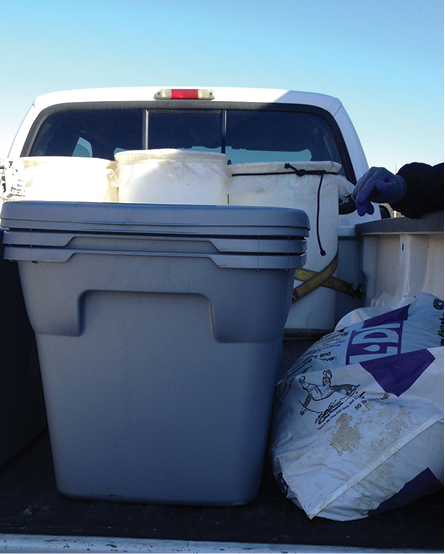
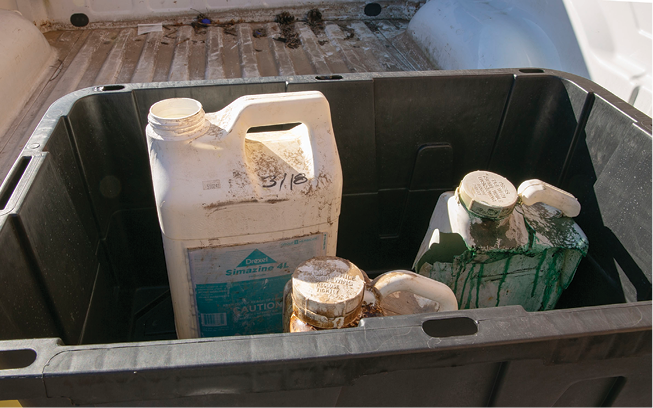
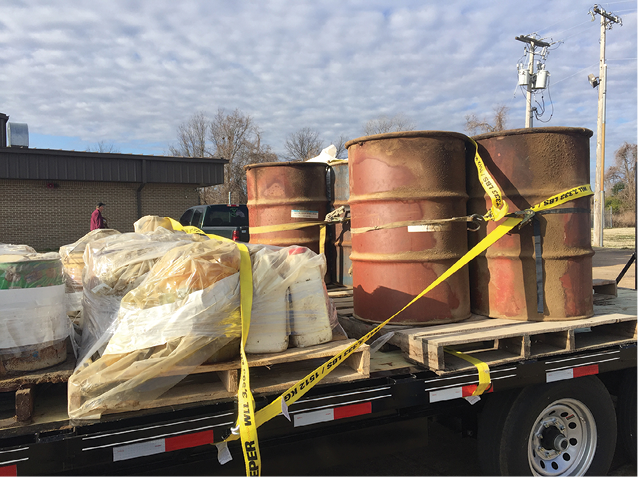
In addition, carry a tarp or plastic cover with you during transport in case it rains. It’s also a good idea to have spill-control materials on hand, such as a shovel, broom, and absorbent pads, oil adsorbent, or cat litter (Figure 4). Any spills that occur during transport are the driver’s responsibility. In the case of an accidental spill, contain the spill by absorbing any spilled product immediately; place the saturated absorbent material in a heavy-duty garbage bag or secondary plastic container.
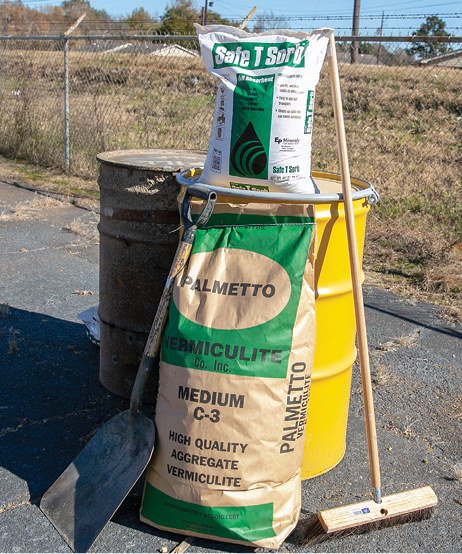
Other Products
It is important to review the details specific to each agricultural waste pesticide disposal event. Frequently, waste tires are also collected at these events. Collection of waste tires is usually made possible through MDEQ waste tire collection grants awarded to individual counties. However, if waste tires are collected, there is typically a limit of two tractor tires and/or ten lightweight automobile tires.
Take-Home Message
Waste pesticides are a nuisance; they take up valuable space, can be expensive to dispose of through hazardous waste companies, and are potential health and environmental hazards. If you are looking for a way to dispose of agricultural waste pesticides, fertilizers, surfactants, or plant growth regulators, watch for agricultural waste pesticide collection events near you beginning in November of each year. Your local county MSU Extension office will have relevant information about upcoming events.
Please remember that it is your responsibility to safely load and transport waste pesticides to collection events. Knowing the rules can help keep you and others safe!
References
Bonner, J. 1998. Planning a Waste Pesticide Disposal Program: The Mississippi Experience. Mississippi State University Extension Service Publication 2194.
Ogg, C.L., J.R. Hygnstrom, E.C. Bauer, and F.J. Bright. Revised October 2019. Safe Transport, Storage, and Disposal of Pesticides. University of Nebraska-Lincoln Extension Circular 2507. Retrieved from https://cropwatch.unl.edu/2019/applying-pesticides-safely. (Accessed October 25, 2019).
Publication 3403 (POD-12-19)
By Mary Love Tagert, PhD, Associate Extension Professor, and John Linhoss, PhD, Assistant Professor, Agricultural and Biological Engineering.
Copyright 2019 by Mississippi State University. All rights reserved. This publication may be copied and distributed without alteration for nonprofit educational purposes provided that credit is given to the Mississippi State University Extension Service.
Produced by Agricultural Communications.
Mississippi State University is an equal opportunity institution. Discrimination in university employment, programs, or activities based on race, color, ethnicity, sex, pregnancy, religion, national origin, disability, age, sexual orientation, genetic information, status as a U.S. veteran, or any other status protected by applicable law is prohibited. Questions about equal opportunity programs or compliance should be directed to the Office of Compliance and Integrity, 56 Morgan Avenue, P.O. 6044, Mississippi State, MS 39762, (662) 325-5839.
Extension Service of Mississippi State University, cooperating with U.S. Department of Agriculture. Published in furtherance of Acts of Congress, May 8 and June 30, 1914. GARY B. JACKSON, Director
The Mississippi State University Extension Service is working to ensure all web content is accessible to all users. If you need assistance accessing any of our content, please email the webteam or call 662-325-2262.


